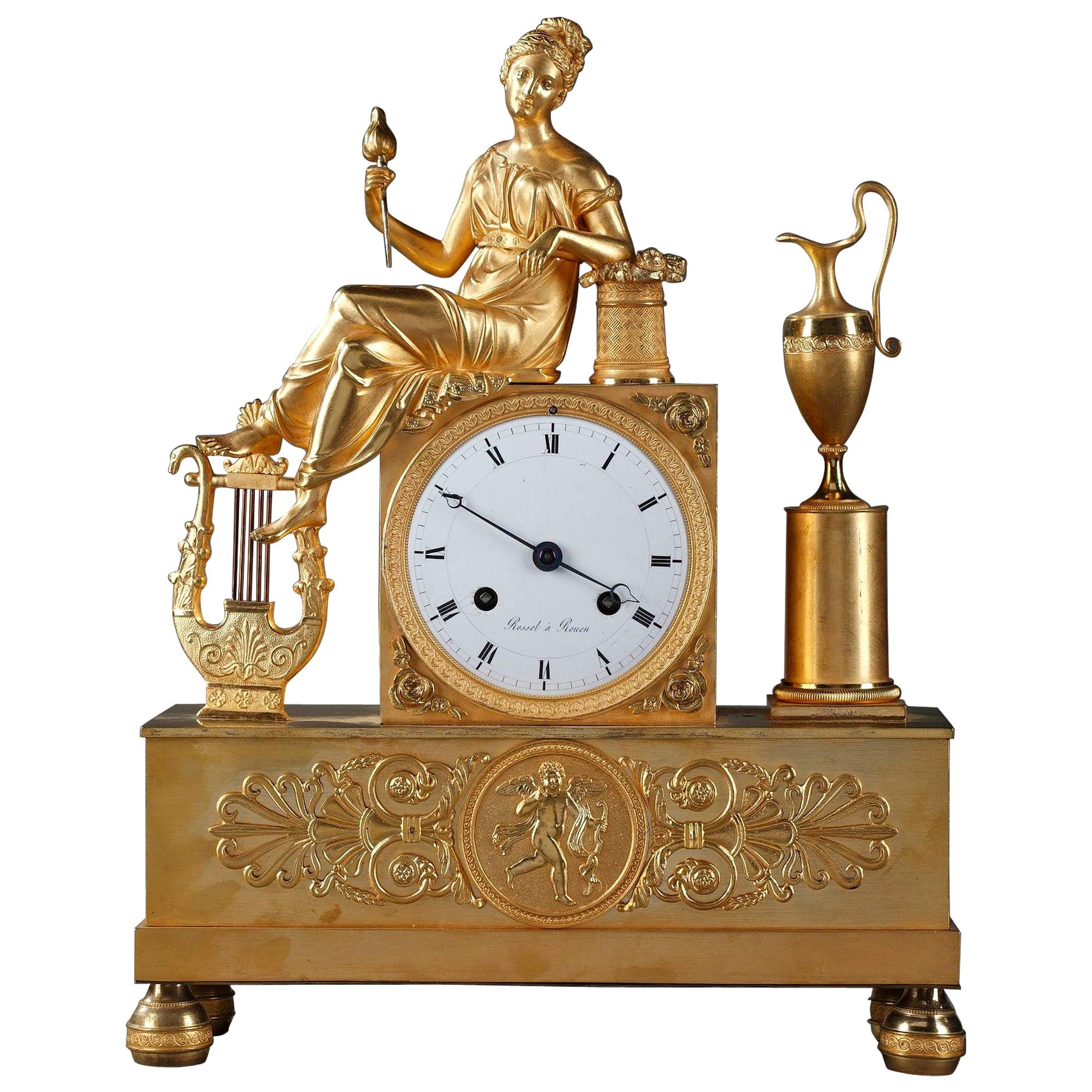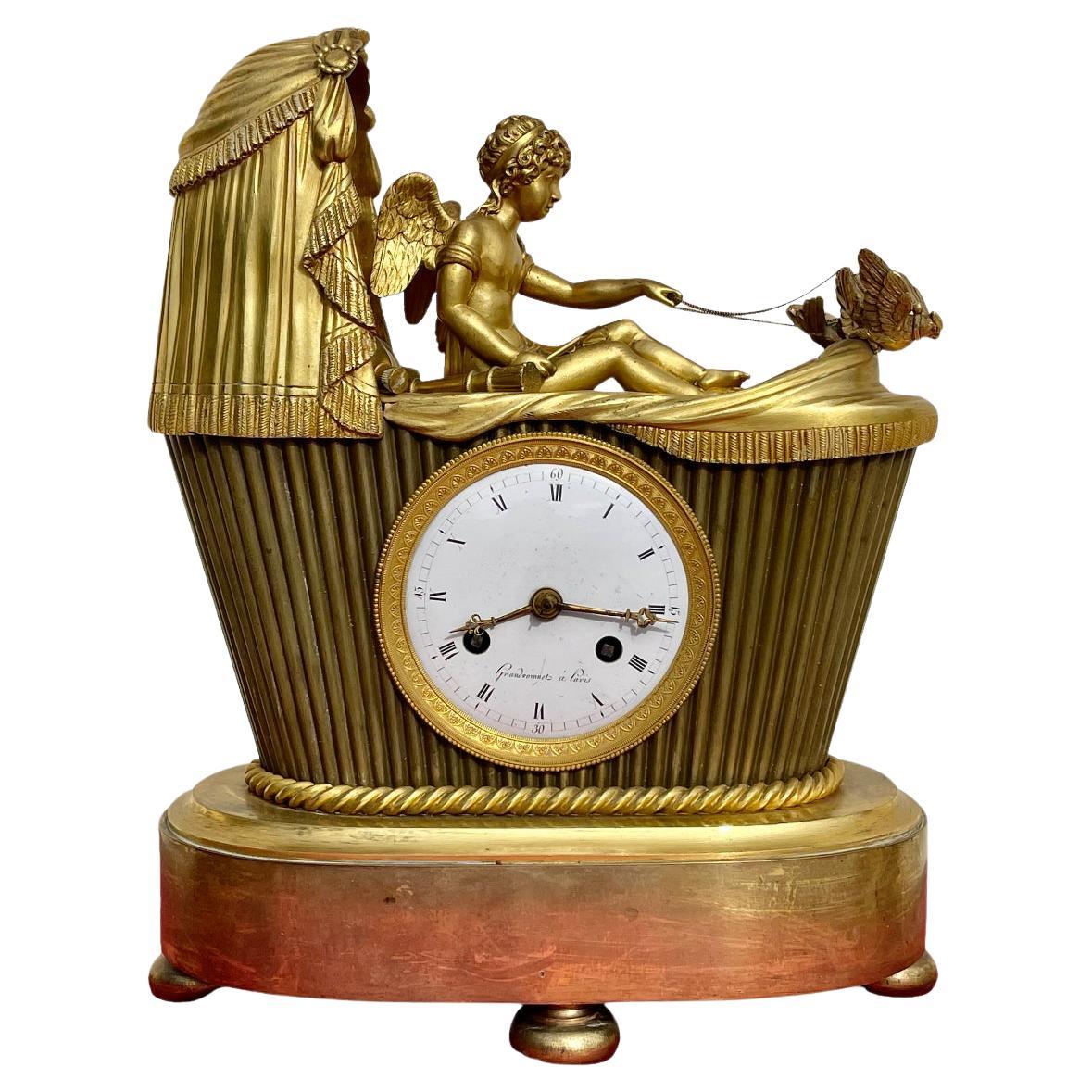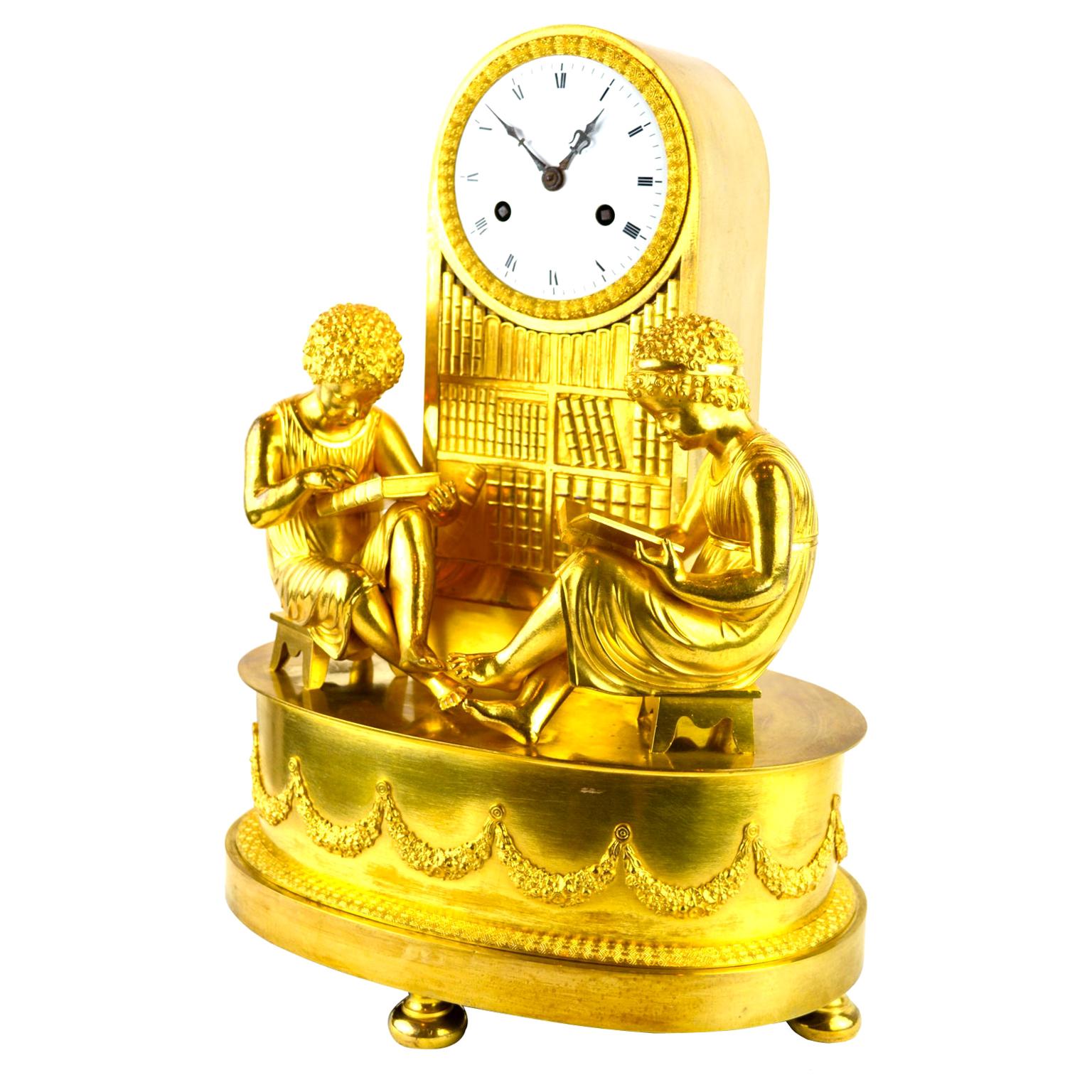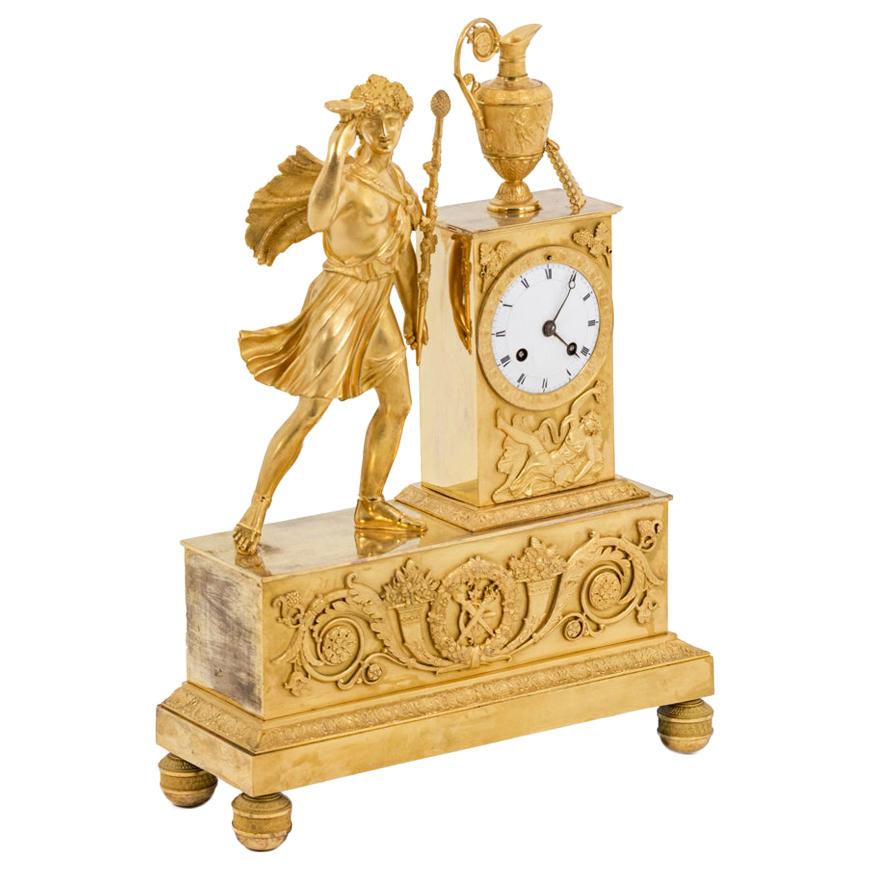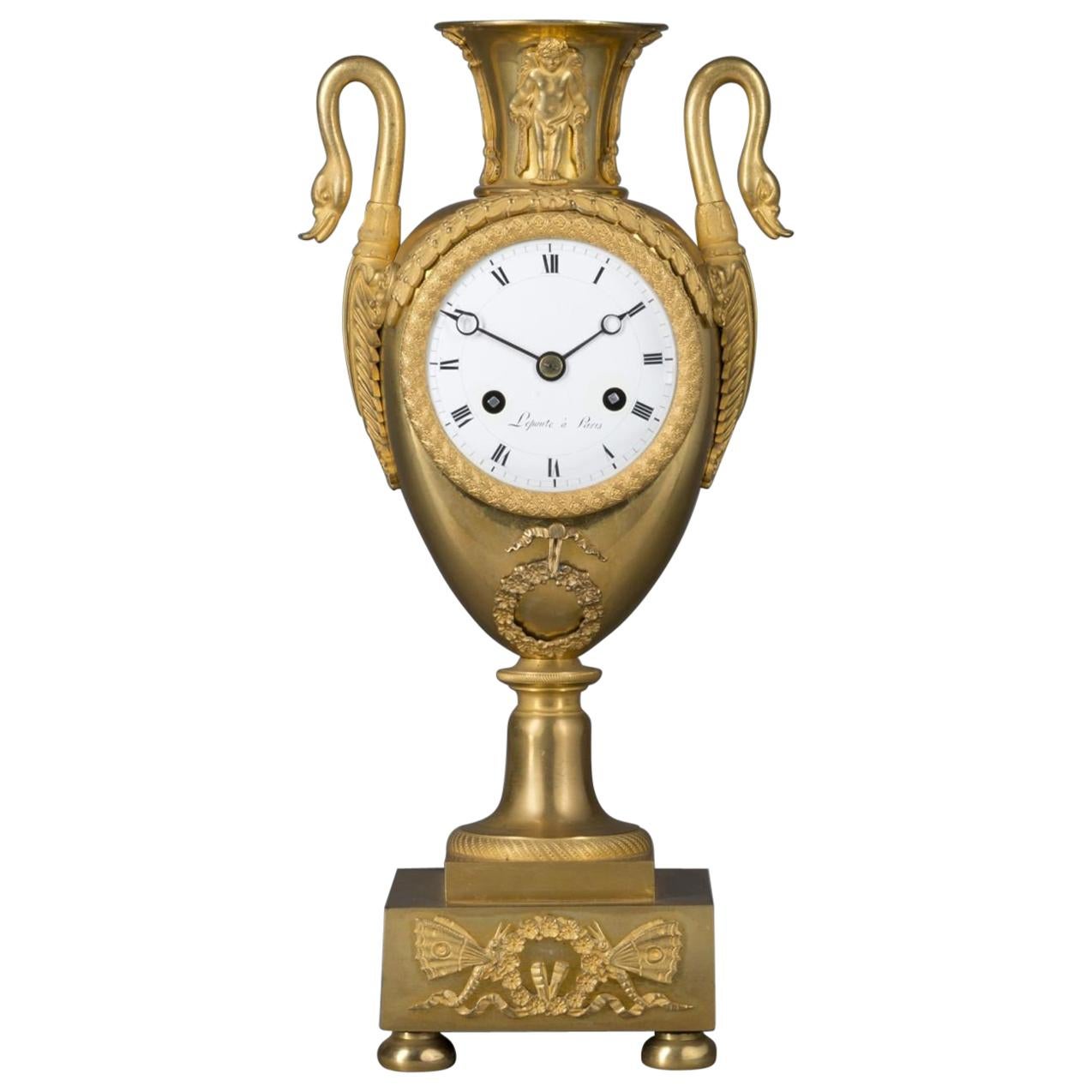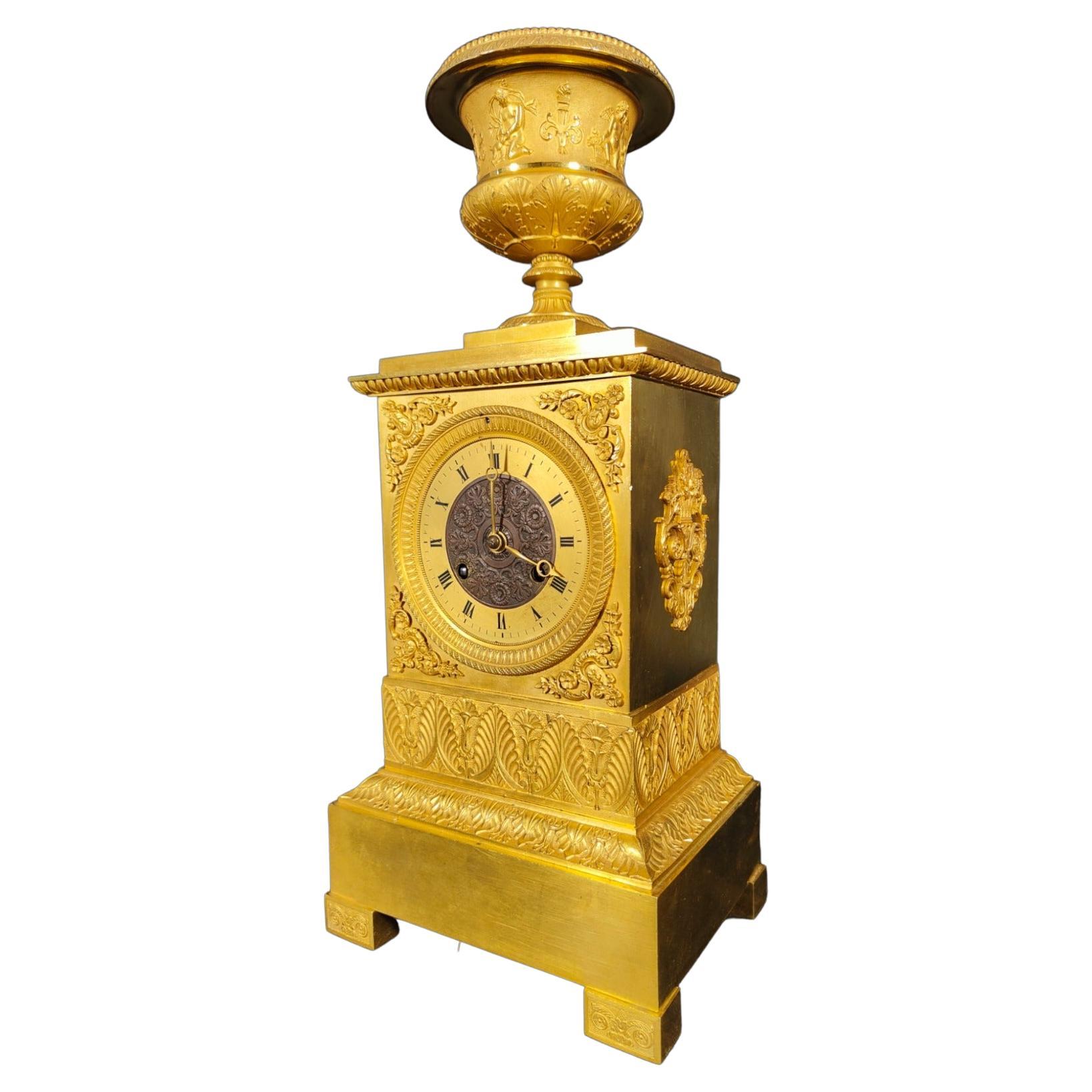Items Similar to Empire Clock The Spinner by Rossel in Rouen
Want more images or videos?
Request additional images or videos from the seller
1 of 14
Empire Clock The Spinner by Rossel in Rouen
About the Item
French Empire pendulum clock finely crafted of gilt bronze, featuring a young spinner wearing a classical dress, seating on the dial near a lyre and an ewer. The base is accented by generous scrolls, palmette and a central medallion with cupid. The white enameled dial telling the hour on Roman numerals is signed ROSSEL à Rouen [Rossel in Rouen]. This small antique clock is set on four toupie feet. Later mechanism, protected by a glass at the rear,
circa 1810
Dimension: W 10.6 in, D 3.9in, H 13.4in.
Dimension: L 27cm, P 10cm, H 34cm.
Bibliography
Two similar models in the Encyclopédie de la Pendule française by Pierre Kjellberg, pp. 336 et 341.
- Dimensions:Height: 13.39 in (34 cm)Width: 10.63 in (27 cm)Depth: 3.94 in (10 cm)
- Style:Empire (Of the Period)
- Materials and Techniques:
- Place of Origin:
- Period:
- Date of Manufacture:1810
- Condition:Wear consistent with age and use. In overall good condition. The clockwork has been cleaned, serviced and is in working condition.
- Seller Location:Paris, FR
- Reference Number:
About the Seller
4.9
Gold Seller
These expertly vetted sellers are highly rated and consistently exceed customer expectations.
Established in 2001
1stDibs seller since 2016
Typical response time: <1 hour
- ShippingRetrieving quote...Ships From: Montesson, France
- Return PolicyA return for this item may be initiated within 14 days of delivery.
More From This SellerView All
- Empire Pendulum Clock the Spinner, Signed Rossel in RouenBy Rossel in RouenLocated in Paris, FRFrench Empire pendulum clock finely crafted of gilt bronze, featuring a young spinner wearing a classical dress, seating on the dial near a lyre ...Category
Antique Early 19th Century French Empire Mantel Clocks
MaterialsBronze
- Early 19th Century Empire Mantel Clock with Cupid in a ChariotBy Marie PrevostLocated in Paris, FRExceptional gilt bronze mantel clock with its key depicting a winged Cupid in a chariot. The chariot is pulled by two doves that are resting on a platform adorned with water-leaf. Th...Category
Antique Early 19th Century French Empire Mantel Clocks
MaterialsBronze
- 19th Century Empire Ormolu Mantel Clock, FidelityLocated in Paris, FREarly 19th century Empire clock crafted of gilt bronze, or ormolu, featuring an allegorical scene with a woman sitting at her work table play...Category
Antique Early 19th Century French Empire Mantel Clocks
MaterialsBronze
- Late 19th Century Empire-Style Longcase ClockLocated in Paris, FRImpressive mahogany longcase clock with gilt and sculpted decorative bronze elements such as fantastic animals, diamond-shaped patterns, scrollwork, and foliage. This floor clock is ...Category
Antique 1880s French Empire Grandfather Clocks and Longcase Clocks
MaterialsBronze, Ormolu
- Empire Period Gilt Bronze Lyre-Clock with a Bust of HomerLocated in Paris, FRImportant clock-regulator entirely realized in gilded bronze of the Empire period. It has a lyre shape with seven strings and a bust of Homer crowned ...Category
Antique Early 19th Century French Empire Mantel Clocks
MaterialsBronze
- Alabaster Clock, "The abduction of Europa"Located in Paris, FRRare alabaster clock representing "The abduction of Europa" by Zeus metamorphosed into a bull. Europa, dressed in an antique tunic revealing a breast, is ...Category
Antique 1830s French Restauration Table Clocks and Desk Clocks
MaterialsAlabaster, Bronze
You May Also Like
- Grandvoinnet In Paris - Bronze Clock From The Empire PeriodLocated in Beaune, FRVery beautiful gilded bronze pendulum from the Empire period (18th century) representing Cupid seated in the chariot of Venus pulled by two doves. The enamel dial is signed "Grandvoi...Category
Antique 18th Century French Empire Table Clocks and Desk Clocks
MaterialsBronze
- Allegorical French Empire Clock Referred to as "The Library Clock"Located in Vancouver, British ColumbiaA rare model of a French Empire clock in gilded bronze called The Library, featuring a boy and a girl dressed in classical attire diligently studying in a library, both are sitting on a stool in front of a clock which is integrated into a column which also serves as a bookshelf. The oval clock...Category
Antique Early 19th Century French Empire Mantel Clocks
MaterialsBronze
- Clock in Gilt Bronze, Empire PeriodLocated in Saint-Ouen, FRClock in chiselled and gilt bronze composed by a rectangular base on which stand the dial-plate and a statuette of Bacchus. Round dial-plate with Roman numbers off-center on the righ...Category
Antique 19th Century European Empire Table Clocks and Desk Clocks
MaterialsBronze
- Empire Clock in the Form of a Classical Urn, by Maison Lepautre, circa 1825By Pierre-Basile LepauteLocated in Brighton, West SussexA gilt bronze Empire clock in the form of a classical urn, by Maison Lepautre. French, circa 1825. The dial signed 'Lepaute a Paris'. The clock has an ornate cast bezel with a 3-inch porcelain dial with Roman numerals and Breguet style hands. The twin train eight-day movement with outside count wheel striking on a bell and silk thread suspension. This elegant Empire style clock has a gilt bronze case in the form of a classical urn with swan neck handles and a winged cherub to the neck. The circular pedestal base is raised on a footed stepped square plinth. The Lepaute family were the premier French clockmakers of their day. Their significance lies in their contribution to the clock making industry which had hitherto come under the trade of locksmiths. The family held the brevet Horlogers du Roi. Jean-André Lepaute (1720–1789) arrived in Paris at an early age and in 1740 founded the family business. A skilled artist and mechanic, he quickly gained an excellent reputation. He was received as maître by the clockmakers guild in 1759, was granted royal lodgings from the king in The Luxembourg Palace, and was entrusted with the construction of the majority of the great public clocks of Paris. He executed, amongst others, those in The Luxembourg Palace, the Jardin des Plantes, the Château de Bellevue and the Château des Ternes. His clock at Paris’s École Militaire still works today. Three editions of his Traité d’Horlogerie were published in Paris in 1755, 1760 and 1767. A small volume, Description de Plusieurs Ouvrages d’Horlogerie appeared in 1764. Jean-André’s wife, Nicole-Reine Etable de la Brière (1723-1788), was a highly esteemed mathematician and astronomer. Her passion for science lent itself to Lepaute’s work and she played an active role in the scientific and mathematical aspects of the clock making. Jean-André’s younger brother Jean-Baptiste Lepaute (1727-1802) joined him in Paris in 1747 and immediately started working for the family business. He was received as maître in 1776 and was known for the clocks he constructed for the Paris Hôtel de Ville (1780), destroyed in a fire of 1871, and for the Hôtel des Invalides (1784). Jean-Baptiste took over the workshop when Jean-André retired in 1775. After Jean-Baptiste’s death in 1802, the firm was taken over by his nephew Pierre-Basil Lepaute (1750-1843) where he was duly joined by his own nephew Jean-Joseph (1768-1846) and son Pierre-Michel (1785-1849). By 1816, Pierre-Michel Lepaute was in charge of the business. His masterpieces include the astronomical clock in Paris’s Bureau...Category
Antique Early 19th Century French Empire Mantel Clocks
MaterialsBronze
- Fine Quality French Empire Clock by the Eminent Maker LedieurBy Europa AntiquesLocated in Madrid, ESA fine quality French Empire clock by the eminent maker Ledieur, signed on the backplate of the movement.. The movement is an 8 day bell striking s...Category
Antique 19th Century French Empire Table Clocks and Desk Clocks
MaterialsBronze
- Brisbart In Paris - Empire Period ClockLocated in Beaune, FREarly 19th century Empire period vase-shaped clock in gilded and patinated bronze. It rests on a square base decorated with a frieze representing chimeras. The vase rests on a golden...Category
Antique 19th Century French Empire Table Clocks and Desk Clocks
MaterialsBronze
Recently Viewed
View AllMore Ways To Browse
Small Clock
White Gold Clock
Antique Empire De
Small Decorative Clocks
Antique Clocks Small
Antique Small Clock
Antique Small Clocks
Small Antique Clock
Small Gold Clock
Four Dial Clock
Antique Empire Clock
Pendulum Clocks Glass
French Clocks Small
Antique Clock Signs
Antique Clock Sign
Clock Clock L
Gilt Empire Clock
Antique Clocks In White
